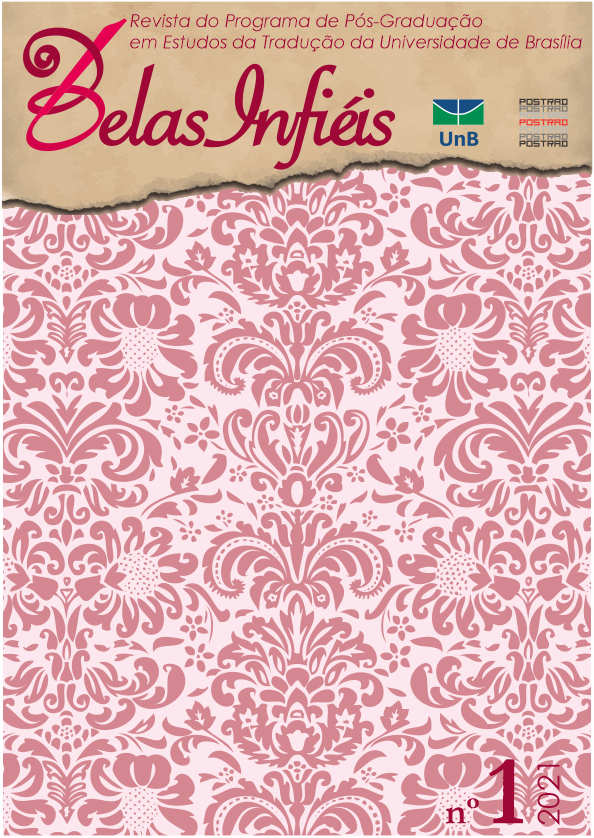Reflections in the environment of audiovisual translation: Interview with Claudia Moreno
DOI:
https://doi.org/10.26512/belasinfieis.v10.n1.2021.35517Keywords:
Translation Audiovisual. CEEMO. Claudia Moreno. Interview.Abstract
As we are interested in discussing subjects related to Audiovisual Translation (AVT), a field that is sometimes ignored in academia, but still appeals to fans of this art and is increasingly motivating professionals, we share this interview with Mexican translator Claudia Moreno, known for her significant experience in this universe. The very first contact with the interviewee resulted from the postdoctoral experience of one of the authors of this publication ”” Leandra Cristina de Oliveira, Ph.D ”” in a country of great importance in the Hispanic ATV industry: Mexico. At the suggestion of Erik Daniel Franco Trujillo, Ph.D, from the Center for Linguistic and Literary Studies of El Colegio de México (CELL/COLMEX), where the academic visit took place, we interviewed Claudia Moreno and talked about diverse subjects, such as her professional career, her experiences in projects of different languages-cultures, the relationship between theory and practice in Translation, the industry, conflicts, challenges, and linguistic decisions, among other subjects. The time she spent with us is detailed in the text below.
Â
Downloads
References
Franco, E., & Araújo, V. L. (2015). Entrevista com Jorge Diaz Cintas. Revista Cadernos de Tradução, 2(6), 311-323. https://periodicos.ufsc.br/index.php/traducao/article/view/6757
Gesser, A. F. (2018). Funcionalidades do pretérito perfeito espanhol em traduções para dublagem: análise de corpus fílmico [Dissertação de Mestrado, Universidade Federal de Santa Catarina]. http://www.bu.ufsc.br/teses/PLLG0725-D.pdf
Hurtado Albir, A. (2017). Traducción y traductología: introducción a la traductología. Cátedra.
Nájar, S. (2007). El doblaje de voz: orígenes, personajes y empresas en México. Salvador Nájar. http://www.salvadornajar.com/
Oliveira, L. C. de, Tavora, B., & Sobottka, M. A. W. S. (2020, julho). La negociación en la oralidad fingida: un estudio sobre las formas de tratamiento en la representación artística del Siglo de Oro. Gragoatá, Niterói, 25(Comemorativo), 268-290, julho 2020. https://periodicos.uff.br/gragoata/article/view/34203
Oliveira, L. C. de, & Gesser, A. F. (2015). La expresión temporal de pasado en el material de audio de una película brasileña traducida en México. Verbum Et Lingua, (5), 39-56. http://verbumetlingua.cucsh.udg.mx/articulo/la_expresion_temporal_de_pasado_en_el_material_de_audio_de_una_pelicula_brasilena_traducida
Orrego, D. C. (2013). Avance de la traducción audiovisual: desde los inicios hasta la era digital. Mutatis Mutandis, 6(2), 297-320. https://dialnet.unirioja.es/servlet/articulo?codigo=5012656
Pereira, L. L. O., & Oliveira, L. C. de. (2018). As formas de tratamento nominais e pronominais em Lope (2010): temporalidade linguística e verossimilhança. Letra Magna, 14(23), 451-472. http://www.letramagna.com/artigos_23/artigo29_23.pdf
Downloads
Published
How to Cite
Issue
Section
License
Copyright (c) 2021 CC BY

This work is licensed under a Creative Commons Attribution 4.0 International License.
Given the public access to this journal, the texts are free to use but requires the recognition of the original authorship and initial publication in this journal to be properly stated.
 The journal allows the use of works published for non-commercial purposes, including the right to submit the work to publicly accessible databases. Published contributions are the sole and exclusive responsibility of the author(s).Â



















